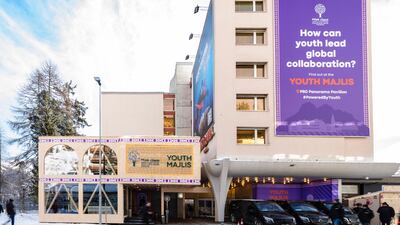The Mohammed bin Salman Foundation, Misk, is hosting what it calls the Youth Majlis as it returns to Davos for a fifth year at the World Economic Forum.
The Majlis — a place where people gather to sit together — aims to provide a forum for “forward-looking” dialogue and to be a melting pot for collaborative solutions to critical global issues.
Those include fighting inequality with inclusive economic growth and boosting climate action, in line with WEF global perspectives in Davos.
“Our Youth Majlis at the World Economic Forum builds on the momentum established during the Misk Global Forum 2022 when we set out to promote global multi-generational dialogue,” Amani Alkhiami, senior research manager at Misk in Davos, told The National.
More than 35 global leaders and decision-makers from the US, China, Singapore, South Africa, India, Egypt, Indonesia and Saudi Arabia are gathering at the Youth Majlis to promote a youth-focused approach to global collaboration, Misk officials say.
Ms Alkhiami said: “From the green economy to mental well-being, we want to inspire a new generation of leaders. The Youth Majlis creates a platform to do this under the theme of Generation Transformation. It’s an immersive, collaborative space where we serve as a convener and interlocutor connecting the dots between younger and older generations, empowering young people to shape the future.”
The youth forum brings together a diverse range of speakers including Shoukei Matsumoto, managing director of the Japan Fellowship of Buddhists, himself a Buddhist monk, and Arunabha Ghosh, a leading expert on climate and energy. Roman Smolynets, a 24-year-old doctor and influencer from Lviv, Ukraine, will also be speaking, as well as Tariq Al Olaimy, a climate activist and economist.
The chief executive of the Royal Commission for Riyadh City, Fahd Al Rasheed, spoke at the Majlis and said he believes cities are ultimately about bringing people together.
“If I believe, as a young person or old person that I can come there, and be who I need to be, because of education, job opportunities and yes, because of other people, who are doing the same — that is the ultimate power of cities. They bring us together, make us better and that's what I think Riyadh has been doing,” he said.
Anyone is free to join the live sessions with Misk speakers through their YouTube live-stream.
“In a world that is becoming increasingly fragmented, it’s more important than ever to find ways to co-operate, work together and harness the power of youth. Our decision to bring the Youth Majlis back to the World Economic Forum is a powerful step in this direction, placing young people at the heart of the global conversation and empowering them to take bold action for a better future,” said Omar Najjar, chief programme officer at the Misk Foundation.
Last year more than 1,700 visitors from 42 countries, 14 heads of state and ministers, 200 VIP guests and 25 speakers at the World Economic Forum’s Annual Meeting attended the Youth Majlis.

Last year, Misk launched its sixth edition of the Misk Global Forum, welcoming more than 28,000 participants from 64 countries.
So far more than 280 students have graduated from the Misk Fellowship programme to work on 40 projects dedicated to solving challenges associated with UN Sustainable Development Goals.
Saudi Crown Prince Mohammed bin Salman established Misk in 2011. It is a non-profit organisation devoted to cultivating and empowering young people with the tools of learning and leadership for a “better future in Saudi Arabia.”





























































